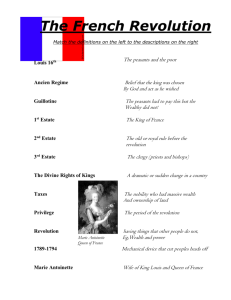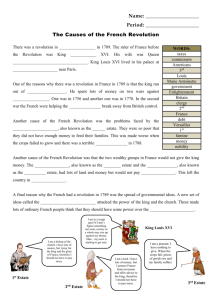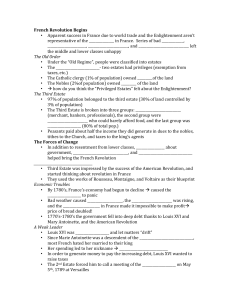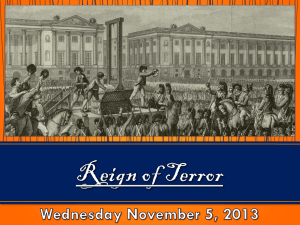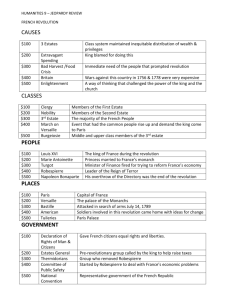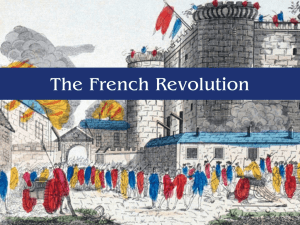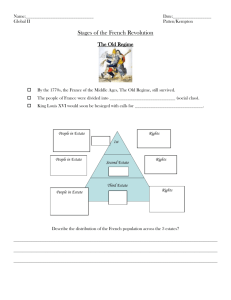French Revolution Profiles
advertisement
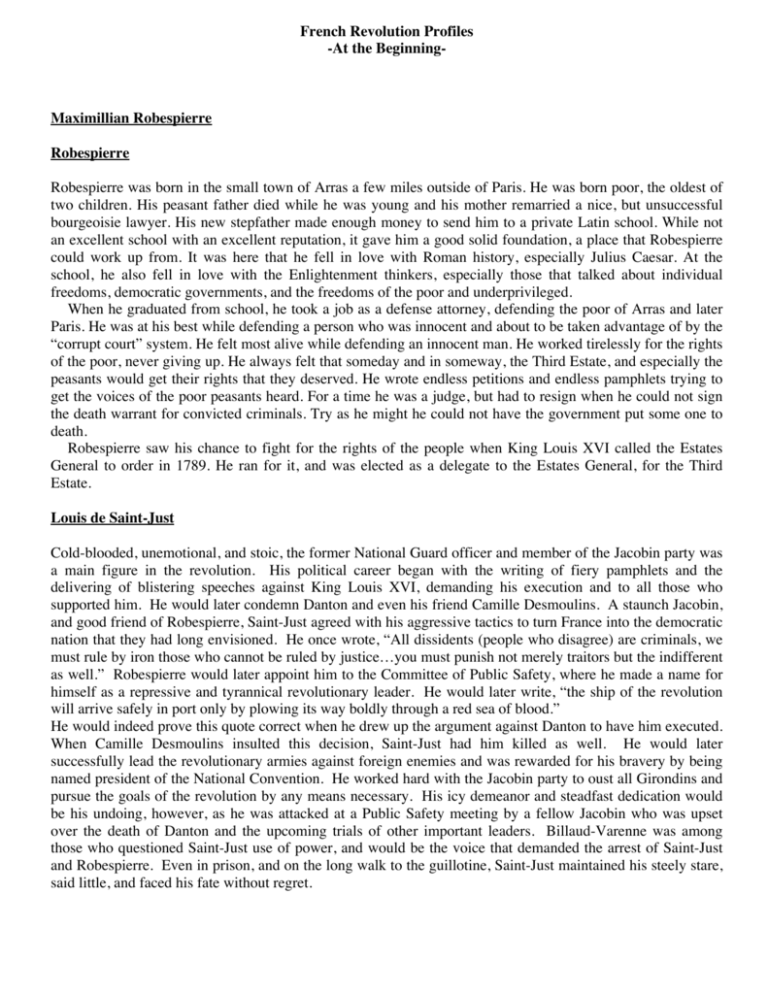
French Revolution Profiles -At the Beginning- Maximillian Robespierre Robespierre Robespierre was born in the small town of Arras a few miles outside of Paris. He was born poor, the oldest of two children. His peasant father died while he was young and his mother remarried a nice, but unsuccessful bourgeoisie lawyer. His new stepfather made enough money to send him to a private Latin school. While not an excellent school with an excellent reputation, it gave him a good solid foundation, a place that Robespierre could work up from. It was here that he fell in love with Roman history, especially Julius Caesar. At the school, he also fell in love with the Enlightenment thinkers, especially those that talked about individual freedoms, democratic governments, and the freedoms of the poor and underprivileged. When he graduated from school, he took a job as a defense attorney, defending the poor of Arras and later Paris. He was at his best while defending a person who was innocent and about to be taken advantage of by the “corrupt court” system. He felt most alive while defending an innocent man. He worked tirelessly for the rights of the poor, never giving up. He always felt that someday and in someway, the Third Estate, and especially the peasants would get their rights that they deserved. He wrote endless petitions and endless pamphlets trying to get the voices of the poor peasants heard. For a time he was a judge, but had to resign when he could not sign the death warrant for convicted criminals. Try as he might he could not have the government put some one to death. Robespierre saw his chance to fight for the rights of the people when King Louis XVI called the Estates General to order in 1789. He ran for it, and was elected as a delegate to the Estates General, for the Third Estate. Louis de Saint-Just Cold-blooded, unemotional, and stoic, the former National Guard officer and member of the Jacobin party was a main figure in the revolution. His political career began with the writing of fiery pamphlets and the delivering of blistering speeches against King Louis XVI, demanding his execution and to all those who supported him. He would later condemn Danton and even his friend Camille Desmoulins. A staunch Jacobin, and good friend of Robespierre, Saint-Just agreed with his aggressive tactics to turn France into the democratic nation that they had long envisioned. He once wrote, “All dissidents (people who disagree) are criminals, we must rule by iron those who cannot be ruled by justice…you must punish not merely traitors but the indifferent as well.” Robespierre would later appoint him to the Committee of Public Safety, where he made a name for himself as a repressive and tyrannical revolutionary leader. He would later write, “the ship of the revolution will arrive safely in port only by plowing its way boldly through a red sea of blood.” He would indeed prove this quote correct when he drew up the argument against Danton to have him executed. When Camille Desmoulins insulted this decision, Saint-Just had him killed as well. He would later successfully lead the revolutionary armies against foreign enemies and was rewarded for his bravery by being named president of the National Convention. He worked hard with the Jacobin party to oust all Girondins and pursue the goals of the revolution by any means necessary. His icy demeanor and steadfast dedication would be his undoing, however, as he was attacked at a Public Safety meeting by a fellow Jacobin who was upset over the death of Danton and the upcoming trials of other important leaders. Billaud-Varenne was among those who questioned Saint-Just use of power, and would be the voice that demanded the arrest of Saint-Just and Robespierre. Even in prison, and on the long walk to the guillotine, Saint-Just maintained his steely stare, said little, and faced his fate without regret. Claire Lacombe Claire grew up as a peasant girl in a small town outside of Paris, called Touluse. Her father and mother were poor farmers. Her grandmother had traveled extensively early in her life and filled Claire’s childhood with adventure stories of her life and travels. Claire yearned for something more out of life than being a peasant farmer in Toulouse. Marriage would have been a way for her to gain money and possibly raise her standing, but she was a Protestant, a Lutheran, in fact, a follower of Martin Luther, who cold not legally marry in France, which was predominantly Catholic. So she dreamed and she yearned. While she dreamed and she yearned, she grew into a powerfully built woman. One day, an acting troop came through town. The jugglers and actors put on a play that reminded Clare of her grandmother’s childhood stories. She was only nineteen, but the actors filled her with such happiness and want for adventure that she ran away with them becoming a powerful actress who would eventually act in a play written by the infamous Olympe de Gouges, the female revolutionary playwright. Eventually, she would move to Paris, where she becomes a powerful force in the French Revolution women’s movement, so much so that she is one of the leading figures in the women’s raid on the palace of Versailles. Olympe de Gouges Olympe de Gouges, was a mighty pamphleteer. She was the voice of the women’s movement. She was loud, proud, often times insulting to the men and especially the ladies of the “nobility”. She was the daughter of a butcher in Paris. She wrote the Necessity of Divorce, a play that outlines why women should seek divorce. She wrote many pamphlets demanding the abolishment of the absolute monarch, as well as Queen Marie Antoinette herself. She also wrote many pamphlets explaining why the Third Estate should have more power, by saying that the Third Estate outnumbers the other two forty times. She was opposed to injustice in any form. While she was a revolutionary in spirit, she opposed the execution of King Louis XVI due mostly to her disdain for capital punishment. A proponent of democracy, she demanded the same rights for French women that French men were demanding for themselves. In her Declaration of the Rights of Woman and the Female Citizen (1791), she challenged the practice of male authority and the notion of male-female inequality. She wrote wildly, maybe too wildly, as it was her writing that ended up in her eventual arrest, and death. Camille Desmoulins Camille was a schoolmate of Maximillian Robespierre, and like Robespierre, he came from very humble beginnings. Camille shared a love for Roman History, especially Julius Caesar with Robespierre. He was tall and very thin. He was so skinny and pale that he looked as if he were sick half of his life. Camille was a screaming radical, he demanded change now, immediately. Change could not happen quickly enough for him. He didn’t want a Constitutional Monarchy, he demanded a pure democracy. He demanded nothing less than pure freedom for the peasants and the other members of the Third Estate. Camille incited crowds to riot all over Paris on what came to be known and “Bastille Day”-on July 14, 1789. He was a participant the day that the Third Estate was locked out of the Estates General and swore the Tennis Court Oath. It was also when many people felt that King Louis XVI was sending troops to Paris to stop the Revolution. The sudden dismissal of Jacques Necker angered Desmoulins. On July 12, 1789 he leapt on a table outside one of a café in Paris, and announced to the crowd the dismissal of the reformer. Drawing two pistols from under his coat, calling "To arms!", he declared that he would not fall alive into the hands of the police who were watching his movements. After this powerful speech to the poor and hungry, the crowds became so angry that they attacked the Bastille, an ancient castle that use to be used by the king to hold political hostages who spoke out against the King, but was currently used to store guns and ammunition. Camille and the poor stormed the Bastille— convincing the people that they would be saving the innocent prisoners, while they would really be taking the guns to arm themselves. Camille became a famous pamphleteer and newspaper reporter, often times calling for the nobility to be hanged by their necks from a Lamppost. This earned him the nickname of the “Lamp Post Lawyer.” Historians and others are unsure if he really believed in what he was doing, or just loved the fame and the glory of being a rebel Madame Roland Madame Roland grew up the daughter of a bourgeoisie tavern and shopkeeper. She loved to read and especially loved the works of Voltaire, Mary Wollstonecraft, and Jean Jacques Rousseau. She loved the idea of women’s rights and freedom for all. She grew up in the city of Seine in the outskirts of Paris. Her bright mind and love of reading scared off many men who would ordinarily love to marry her. She ended up marrying Jean Roland, a government officer twenty year older than she. It was a marriage of convenience and prestige rather than one of love. They moved to Lyon, a small town outside of Paris, where she immediately began to be loved by the peasants nearby. Because of her advanced reading, many of them felt that she had almost magical healing powers. She knew a few things, but most of her “magic” was just common sense remedies she picked up from her reading. Jean, her husband advanced in office and eventually came to head a faction within the National Assembly and Revolutionary government, know as the Girondins. He advanced in office mainly because of his wife, Madam Roland. She writes most of his speeches, letters, petitions, pamphlets, newspaper articles, and leads him to his position on difficult issues. She was the power behind him. She believed that a Republican form of government was best, one where the king still might have some power, but hopefully one in which people elected by the people would rule. “Oh liberty! What crimes are committed in thy name?” She wrote political articles in newspapers in Paris. Wielding her pen as her weapon of choice, she found herself among the most powerful men of France during the height of the revolution. But when the revolution turned ugly, she chose to take a stand, a stand that would not be received well... Pauline Leon Pauline Leon was the daughter of a poor artisan and grew up in Paris. She lived in the Cordelier section of Paris and her father ran a small chocolate business that delivered chocolate throughout the city. When she was only 18 her father and mother died, leaving her alone when the army drafted him into military service where he died in Africa fighting in one of the King’s stupid, wasteful little wars. She was left alone to run the chocolate factory. Before her father died however, her mother died. When her mother died, her father became very lonely and longed for adult companionship. This was easily found in the local tavern. Taverns at this time were places where people could get a drink, grab some food, and have some friendly conversation. It was a good place for Pauline and her father to go because there were plenty of men for her father to talk to as well as plenty of women and young girls for Pauline to play with. More and more however, people began to gather in taverns to read or have read to them (many peasants were illiterate) and discuss the pamphlets which were increasingly circulating, talking about the king and his Austrian wife who was buying castles while the peasants starved. Jacque Billaud-Varenne A lawyer and early member of the Jacobin party, he was a staunch and outspoken anti-Royalist. He published pamphlets demanding the formation of a Republic, which greatly upset the supporters of King Louis XVI and the ideas of constitutional monarchy. In 1793, along with Danton and Robespierre, was elected to the National Convention, where he spoke out against the king, saying vehemently, that he should be “killed within 24 hours.” During his most radical days, he was a leader in forming the revolutionary army, bringing suspects and underperforming generals to trial before the dreaded guillotine, and making fiery accusations against the Girondin faction. He absolutely hated the wealthy nobility, as he called for a tax on the rich, and the equal division of all lands. He would later be named to the Committee of Public Safety, where he would demand the head of Marie Antoinette, and other important moderate leaders. However, his radical views would change, as he began to question the direction of the revolution under the leadership of Robespierre. He would call for the heads of both Robespierre and his good friend Saint-Just. Fearing for his own safety amidst the craziness of the revolution, he turned against Robespierre, and would be a leading voice in his trial and eventual execution. Comte de Mirabeau Grandson of a famed military hero, Mirabeau, tall, fat, and ugly, was destined for the army. As a soldier, he fought in many battles but also engaged in many love affairs despite his ugliness. One of these was with the girlfriend of his commanding officer, which would result in his being thrown in prison. In fact, during his younger life, he would be imprisoned or exiled on 4 different occasions. His violent tendencies often got him into trouble, but it was his keen mind, sharp intelligence, and knowledge of history that kept him sane. He wrote avidly in prison, traveled extensively upon his release, even writing pamphlets in Switzerland, England, Prussia, and America. He would return to France to be a part of the Estates General meeting of 1789, and his enthusiastic voice was always heard, but his advice was not always followed. He believed that the government should exist to protect the rights of people, and that this government should be strong. He was a moderate, in favor of a constitutional monarchy, similar to England’s government. After the events at the Bastille, he warned people to not get too carried away, and that a new government must be formed, so he was a main influence in setting up the first National Assembly. It was here that he desperately tried to work with the Queen and other important leaders to convince everyone that France must work with the King and that he must represent the people fairly. No one listened to him. He tried working closely with Jacques Necker to solve France’s economic problems. Even though he didn’t like Necker, he knew something needed to be done. He was a great speaker, wise statesman, and bold in his opinions, which were moderate, and in support of the king. Jean Sylvain Bailly Bailly was born and raised in Paris. He came from humble beginnings, but he wasn’t as poor as the peasants. His father was a member of the bourgeoisie. His father and mother ran a small private school here. Like Robespierre, Bailly fell in love with the Enlightenment thinkers, especially Jean Jacques Rousseau, and Baron de Montesquieu. He also fell in love with astronomy and the study of the stars. He was a professor in the Paris Academy of Sciences, a very prestigious university, when the Estates General was called. He decided to run for office with a Third Estate, and to give up a career in astronomy. He was elected to the Estates General and was eventually elected to Mayor of the city of Paris. It was hoped that he would help the plight of the commoner, but he did not. In fact Bailly became so frightened that the anger and the power of the Third Estate and he and Marquis de Lafayette (head of the National Guard—a military police force), declared marital law. This only allowed the members of the Third Estate to leave their homes at certain hours, and forbade them form protesting or speaking badly about the new government. Bailly felt that it would be far too dangerous to allow the Third Estate to have control of the government. He was in favor of a constitutional monarchy, possibly with a new king…. Bailly was eventually killed during the Reign of Terror. He was put to death at the Guillotine. Pierre Vergniaud You are Pierre Vergniaud. Before the Revolution of 1789, you were a lawyer in Bordeaux. Like Maximilian Robespierre, you fought for the rights of the poor and the oppressed. Like Robespierre, you felt that the most good could be done by you if you were in Paris where all the decisions were being made. In 1791, you were elected to represent Bordeaux in the National Assembly. Because of your great oratory ability, your eloquence, and your views that revolutionary change can only come slowly with much work, and without violence, you were elected leader of the Girondin faction as well as the president of the National Assembly. You became known as a clear minded and passionate leader of the National Assembly who spoke in such a way that all people listened and all windows shook. It was due to one of your speeches that the king was dethroned and a full republican government headed by the National Assembly and National Convention took power. But soon after, you had to speak in defense of your life, and for that of your fellow Girondins. Although you did fight for the rights of the people and for the freedom of all people, you were killed during the Reign of Terror. Marat Marat was the most rabid radical in all of the French Revolution. He demanded change now and would not wait. He wrote fiery pamphlets and newspaper articles In his newspaper, the “Friend of the People”, he called for the destruction of the king’s power, the death of most if not all of the nobles, and the death of defrocking of all the clergy. Marat was a bourgeoisie doctor who gave up his medical practice, which served poor peasants and bourgeoisie to demand a radical revolution. He called for the immediate destruction of the monarchy, and the immediate development of a pure democracy. For many people at this time, democracy meant freedom, equality, and the right to vote for white males only. This didn’t include blacks, women, Jews, or other minority groups. Marat wanted a total revolution and would not compromise. He and Robespierre shared similar ideas but Robespierre was too nice for Marat’s taste. Marat wrote in a guttural language loved by the common people. He wrote about chopping off heads, slitting nobles throats etc. His writings so angered Bailly, The mayor of Paris and Marquis de Lafayette a noblemen who was in favor of rights for the Third Estate and in charge of the National Guard, Paris’s police force, that they tried to arrest him several times, so the he wouldn’t be able to write anymore newspapers or pamphlets. They pursued him so doggedly, that he was forced to hide in sewers for long periods of time. He hid there for so long, that he contracted a skin disease that ate at his flesh and made him smell bad for the rest of his life. From the time he contracted this disease on, the only time he felt comfortable was when he was taking a bath, the rest of the time, his skin itched horribly. It was in his bathtub that he was murdered by Charlotte Corday. Marquis De Lafayette Marquis de Lafayette was born into a wealthy noble family. Unfortunately, his father died when he was very young, forcing him to take over his father’s estates and care for his mother, younger brothers and sister. When he took over his father’s lands and began working more closely with them, he felt very sorry for them, and wanted to help them. During the American Revolution, Lafayette was one of the French soldiers to go to American and help them gain their freedom. It was here that he fell in love with freedom and the ideas of equality. He became very close friends with George Washington, and came to regard him as a father figure. When he returned to France, he also got caught up in the wave of new freedoms. When the 3rd Estate took the Tennis Court Oath and declared itself the National Assembly, he left the 2nd Estate and joined them. He was then given command of the National Guard (Paris’s police force). As time went on, Lafayette began to feel that the peasants and others could not handle the new freedom they were asking for. He began to feel increasingly that a republic or a democracy would not work. He began to feel that perhaps, all that was needed was a new king, someone other than King Louis XVI, someone who would honor the rights of the Third Estate, someone who could save France from its financial trouble, but still remain in control, or at least a constitutional democracy. Lafayette began to realize that sometimes too much freedom is bad. He felt that writers and pamphleteers like Marat were bad for reform and revolution, writers who wrote about slitting noble throats and cutting off noble heads. He chased Marat so much, that Marat would have to hide in the sewers. Even though Lafayette chased him into the sewers, Marat remained one of the most popular revolutionaries of the French Revolution, while Lafayette’s own popularity dwindled as time went on. Theroigne De Mericourt Well-educated, quick-witted, and attractive, Theroigne was a striking figure in the revolution due to her intense passion and wonderful speaking ability. As a young woman, she ran a salon where future revolutionary leaders such as Desmoulins, Danton, Mirabeau and Sieyes would hang out to discuss political matters. Member of the Girondin faction, she was an enemy of Robespierre and because she would interrupt the National Assembly with her loud expressions, she became known as the Fury of the Girondins. With a pistol tucked into her belt, and a sword dangling at her side, she commanded riots and marches and even killed a writer in the midst of a riot. She toned down her behavior and became less popular with the people, but her image as the female fighter of the revolution lived on. Abbe Sieyes Emmanuel-Joseph Sieyes came from a middle class family in France. He was the son of a Bourgeiosie and was able to attend school. After graduation he sought a career in the church. He was bright, articulate, and very interested in God and religion. This caused him to rise rapidly in the church. Soon he held a very high position within church. Even though he rose rapidly he was always held back by the fact that he came from a middle class background. In short, he didn’t have the money to buy a position like many other members of the clergy. Sieyes saw the French Revolution as a way to end noble privilege and to ensure that every estate got an equal chance. Sieyes always championed the common man and achieved considerate fame and glory as a result. He was not a member of the Third Estate but did write a powerful pamphlet called “What is the Third Estate?” In it he argues that without the peasants and bourgeoisie that make up the Third Estate, France would be nothing. He claims that the Third Estate is everything but they have no power. He writes that it is time for the Third Estate to have power. After the Third Estate took the Tennis Court Oath and created the National Assembly, he was elected to it and voted for the execution of King Louis XVI when he was put on trial in front of the National Assembly. Like Marat, Sieyes was rude and quarrelsome, however he had political power. However, Sieyes is remembered for pointing out one of the most important ideas of the Revolution that the Third Estate should own the government, the government should not own the Third Estate. “What is the Third Estate” made him famous, but his drafting of the Declaration of the Rights of Man and Citizen made him a legacy. At the National Convention, he opposed the abolition of tithe collection, and of the takeover of Church lands. He voted for the execution of King Louis XVI, and was swept up in the fervor of the revolution. He would later simply say when questioned about his behavior, “I survived.” Jacques Necker Necker was a Swiss born accountant. He was tired by King Louis XVI to reform France’s financial crisis. Even though Necker was a good accountant there was no way he could reform France’s economy because it was too late. Necker was a man of the even temperament. He knew how important his position was and worried himself and worked himself until late into the night. He never spoke without first measuring each word, afraid that anything said might be misunderstood and led to the downfall of France once and for all. He was fired several times by King Louis XVI, but he was always brought back because the people loved him. They didn’t love him because he was winning or making their lives better, but he did attempt to keep the price of bread from rising while many of the people of France were starving to death. Many of the Third Estate saw him as their savior, if the king would just listen to him. Although the Third Estate loved him, the nobles greatly mistrusted him because they felt that he was planning to take away their riches. They tried to stop any reforms he would make. He was a very old man and very cautious, and many of the radical members of the Third Estate, like Robespierre and Marat felt that he was being too careful and cautious. Duc De Orleans The Duc De Orleans was a young vivacious man during the early days of the Revolution. He was a playboy, he liked to play hard, and he liked his women to. He was a noble, the king’s cousin in fact, and was of course born into and used to the wealth given to a king. He was elected to the Estates General as a representative of the Second Estate. While there, he attempted to join the Third Estate, and does in fact when the Third Estate walks out, takes the Tennis Court Oath, and forms the National Assembly. He believed very much that the Third Estate should be allowed to have more rights, but he didn’t believe that there should be a Republic. He felt at the most there should be a constitutional monarchy, but he truly believed there should still be a king, be he felt there should be a new king. In fact, he felt that he should be the new king. He felt that he could do a much better job of leading the country than Louis XVI could. Danton Georges-Jacques Danton was born in Champagne, France. His father died when he was young, but his mother remained. His stepfather was an easygoing lawyer who wasn’t rich, but was definitely a member of the Bourgeoisie. Due to this, Danton was able to attend school and eventually became a lawyer himself. Danton was basically lazy. He could tell a good story, had a deep strong voice, gift for speaking, and could think on his feet, but he was never interested in doing good and working for the rights of the people. When he became a lawyer, he moved to Paris where he began to work for rich bourgeoisie attempting to prove that they were really nobles. If a bourgeoisie could become a noble, he had a chance to get a better job, and earn more money to improve his life and that of his family. Danton could prove this, but it cost a lot of money. Danton never took his law practice seriously, he was always in it to the buck. When the Third Estate walked out of the Estates General, he began to smell a money-making opportunity. He got himself elected to the National Assembly and many other positions by speaking boldly and loudly, but his interest lay in making money and gaining power. The turbulent times of the French Revolution, he then became one of Lafayette’s greatest enemies, but Danton didn’t like Marat much either (though acted like he did—because Marat was so popular with the common folk). He didn’t like him because he felt that Marat was too extreme and couldn’t control himself. Danton also took bribes from anyone who would give them to him. Even though he took the money, he never changed his mind on an issue. Member of the Nobility/Clergy You are a member of the nobility. You are a duke, or an earl, a prince, a lady, or a princess. You were born into money and you inherited a title from your parents. For years you have ruled you land as your father did. You felt that you were good to your king, made money, enough to consider yourself rich, but you felt that you also took good care of your peasants. You knew trouble was brewing when King Louis XVI was forced to call the Estates General. You knew that your way of life might be over. After seeing the Third Estate, ignorant, filthy and angry at the Estates General you began to become frightened. When the Third Estate walked out of the Estates General and declared themselves the National Assembly, you began to realize that your way of life might be over. You began to write letters to friends in Austria and Prussia, especially to the kings and queens of those countries who are related to your Queen Marie Antoinette. You began to tell them stories of how the Third Estate in all its ignorance was attempting to take over the government and make it into a democracy. You began to tell them of your fear that if the people could take down one king, perhaps more could as well. They began to become fearful of losing their crowns, and began to talk of invading France and restoring King Louis to the thrown. You began to make plans to become an émigré, or a member of the first or second estate who took their money and ran to Austria or Prussia to help plan an invasion of France. You still cannot believe all that had happened. King Louis XVI and Queen Marie Antoinette Both King Louis XVI and Queen Marie Antoinette were born to extreme wealth and born into royalty. King Louis XVI’s great grandfather, King Louis XIV, is the best example of an absolute monarch. Louis XIV came to be called the Sun King because he was like the sun; all things living in France depended upon him and his power for life. Louis XIV controlled everything about France. “I am the state,” was his favorite quote, meaning that he truly was the government. This was what Louis XVI was born into. He was a shy reserved man, who loved science, inventions and hunting. At all three of these, he excelled. At his castle in Versailles, he created simple machines, worked out mathematical equations, and kept lists of all the literally thousands of animals he shot. Unlike his grandfather, however, he was not a brave, insightful, or good leader. Instead, he was shy, quiet, reserved, and cuckolded by his wife. Where his grandfather used Versailles to control the nobles, Louis used it to hide form his problems and form the people of France. Queen Marie Antoinette also grew up in wealth and was surrounded by the absolute monarchy in her parent’s kingdoms of Austria and Prussia. Neither she nor Louis could imagine any other type of government other than venturing outside the castle or close guard of her family. She led a very sheltered life and could therefore never truly relate to the struggles of the peasants, Bourgeiosie, or even some of the nobility. She was born to wealth and could not see past that. Bishop Talleyrand Born into a family of means, it was known that there were only three paths that his life could follow. Number one—service in the king’s army as an officer of course, hopefully reaching the rank of general early in life and distinguishing yourself in battle. Number two—you could become a courtesan—or politician, entering the King’s service and serving him as governor, or exchequer, or in some other capacity. And number three— you could become a priest. When he was around 15 months old, his nanny dropped him down a flight of stairs, purely by accident, but for the rest of his life, you would have a cleft foot, and would always walk with a limp. From then on it was obvious what his future occupation would be. With a cleft foot and limp, he could not perform the duties required of a military officer, so that was out, with the cleft foot and limp he could not do the required dancing for a courtesan, so the priesthood was all that was left. As a young man he began to read the works of Voltaire and other Enlightenment thinkers who were being banned all over France. With a heavy heart he entered the priesthood, not only not interested in working for God, but also still very interested in women. As a priest he made a poor one, but as an advocate for the poor and downtrodden Third Estate, he made a fine man. When the Third Estate walked out of the Estates General and took the Tennis Court Oath, he was one of the members of the First Estate who stood with them. From that day fourth, he never left their side and fought with them for their rights and freedom throughout the revolution. Even though he was a member of the 1st Estate, Talleyrand was a full supporter of the revolutionary cause. Among other things, Talleyrand worked with Mirabeau to nationalize Church properties, promoted public education instead of religious education, helped write the Declaration of the Rights of Man, and proposed the Civil Constitution of the Clergy, making church lands property of the government. He was even excommunicated (kicked out) of his Catholic order by the pope due to his involvement in these revolutionary pursuits. Even though he stood for the revolution, and had his hand in many positive changes for the poor of France, because of his wealthy 1st Estate background, a warrant went out for his arrest and trial in 1792… Femme Sans Culottes A once disrespectful term to describe the poor of France, who could not afford the fancy knickers worn by the more wealthy. The women who belonged to the Sans Culottes (“without pants”) were known widely as the most radical and militant revolutionaries. Even the Jacobins were frightened by their passion. The demands of these women were less about political equality, and more about surviving. Women were the ones standing in bread lines, women were the ones paying absurd prices for bread during the famines of the late 1770s, and these women would be the ones to get rowdy in response to the shortages and rising prices. They shouted and stamped their feet in unison, and took merchandise from merchants, sold their goods at fair prices and returned the proceeds to them. They also circulated pamphlets and participated in riots and other insurrections. They would set up the Society of Revolutionary Republican Women in 1793, the first political interest group for women in western history. While the revolution was at its height in 1793, these women supported Robespierre and played a major role in mobilizing the poor of the countryside to fight for their lives. But after the guillotine blades stopped falling, the Sans Culottes power began to fade without leadership. The Directory cleaned out the leaders of the Sans Culottes, and made it highly undesirable to be a member of the infamous group. Old revolutionary femme Sans Culottes began splitting up, traveling to other lands, and continued their work by forming preaching their message and forming renegade groups to fight against the government. Femme Sans Culottes A once disrespectful term to describe the poor of France, who could not afford the fancy knickers worn by the more wealthy. The women who belonged to the Sans Culottes (“without pants”) were known widely as the most radical and militant revolutionaries. Even the Jacobins were frightened by their passion. The demands of these women were less about political equality, and more about surviving. Women were the ones standing in bread lines, women were the ones paying absurd prices for bread during the famines of the late 1770s, and these women would be the ones to get rowdy in response to the shortages and rising prices. They shouted and stamped their feet in unison, and took merchandise from merchants, sold their goods at fair prices and returned the proceeds to them. They also circulated pamphlets and participated in riots and other insurrections. They would set up the Society of Revolutionary Republican Women in 1793, the first political interest group for women in western history. While the revolution was at its height in 1793, these women supported Robespierre and played a major role in mobilizing the poor of the countryside to fight for their lives. But after the guillotine blades stopped falling, the Sans Culottes power began to fade without leadership. The Directory cleaned out the leaders of the Sans Culottes, and made it highly undesirable to be a member of the infamous group. Old revolutionary femme Sans Culottes began splitting up, traveling to other lands, and continued their work by forming preaching their message and forming renegade groups to fight against the government. Femme Sans Culottes A once disrespectful term to describe the poor of France, who could not afford the fancy knickers worn by the more wealthy. The women who belonged to the Sans Culottes (“without pants”) were known widely as the most radical and militant revolutionaries. Even the Jacobins were frightened by their passion. The demands of these women were less about political equality, and more about surviving. Women were the ones standing in bread lines, women were the ones paying absurd prices for bread during the famines of the late 1770s, and these women would be the ones to get rowdy in response to the shortages and rising prices. They shouted and stamped their feet in unison, and took merchandise from merchants, sold their goods at fair prices and returned the proceeds to them. They also circulated pamphlets and participated in riots and other insurrections. They would set up the Society of Revolutionary Republican Women in 1793, the first political interest group for women in western history. While the revolution was at its height in 1793, these women supported Robespierre and played a major role in mobilizing the poor of the countryside to fight for their lives. But after the guillotine blades stopped falling, the Sans Culottes power began to fade without leadership. The Directory cleaned out the leaders of the Sans Culottes, and made it highly undesirable to be a member of the infamous group. Old revolutionary femme Sans Culottes began splitting up, traveling to other lands, and continued their work by forming preaching their message and forming renegade groups to fight against the government. Member of the Nobility/Clergy You are a member of the nobility. You are a duke, or an earl, a prince, a lady, or a princess. You were born into money and you inherited a title from your parents. For years you have ruled you land as your father did. You felt that you were good to your king, made money, enough to consider yourself rich, but you felt that you also took good care of your peasants. You knew trouble was brewing when King Louis XVI was forced to call the Estates General. You knew that your way of life might be over. After seeing the Third Estate, ignorant, filthy and angry at the Estates General you began to become frightened. When the Third Estate walked out of the Estates General and declared themselves the National Assembly, you began to realize that your way of life might be over. You began to write letters to friends in Austria and Prussia, especially to the kings and queens of those countries who are related to your Queen Marie Antoinette. You began to tell them stories of how the Third Estate in all its ignorance was attempting to take over the government and make it into a democracy. You began to tell them of your fear that if the people could take down one king, perhaps more could as well. They began to become fearful of losing their crowns, and began to talk of invading France and restoring King Louis to the thrown. You began to make plans to become an émigré, or a member of the first or second estate who took their money and ran to Austria or Prussia to help plan an invasion of France. You still cannot believe all that had happened.
